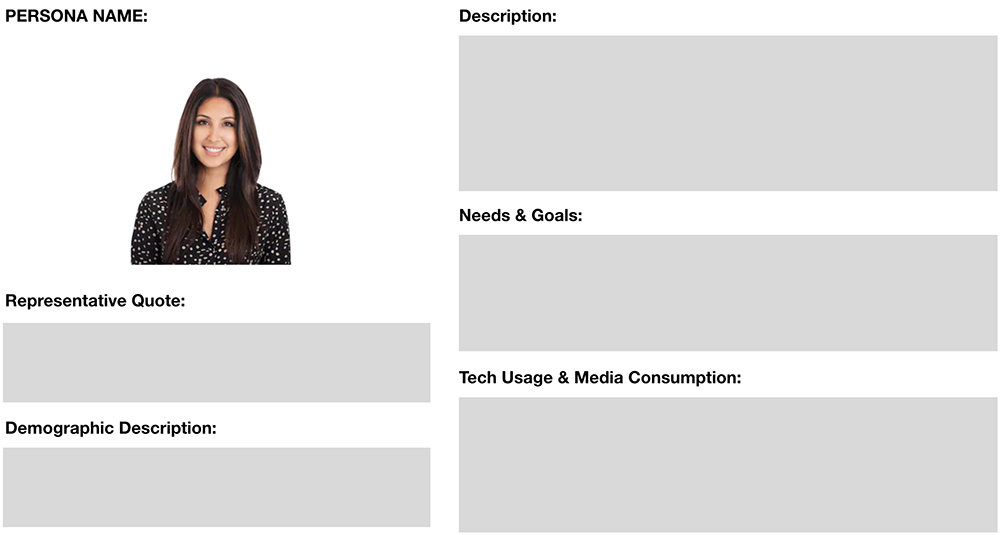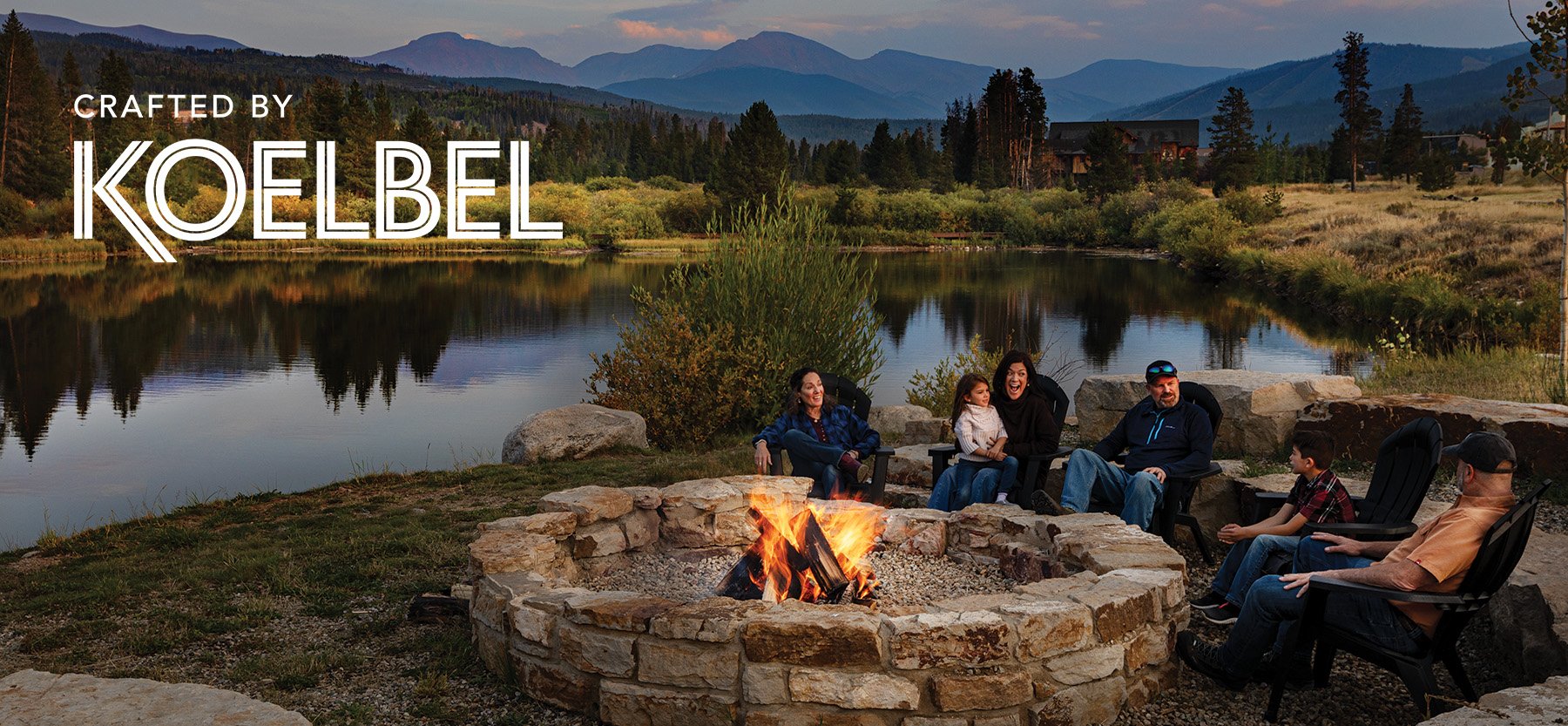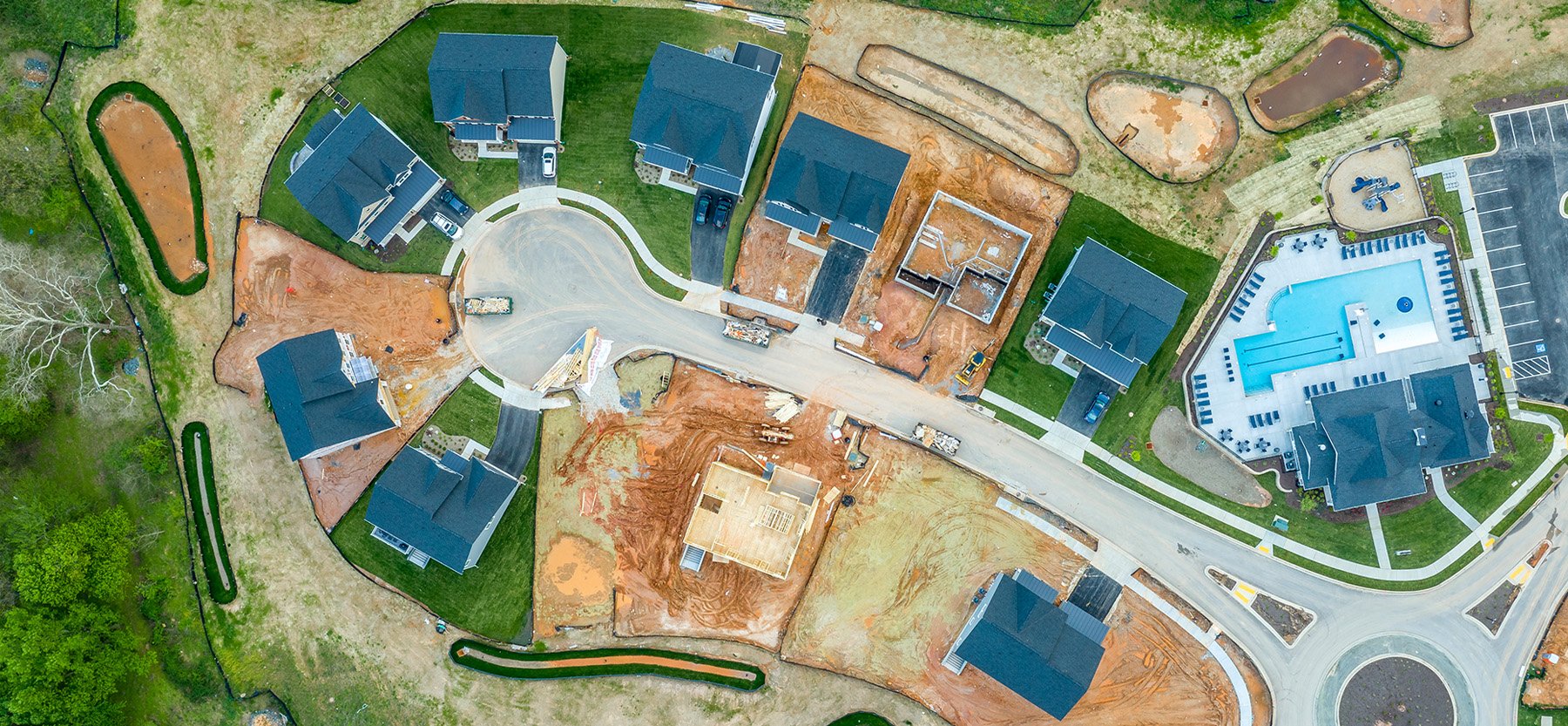April 24, 2023
Real Estate Personas and Target Audiences in 6 Steps
Real estate personas and target audiences—what are they and how can they help with your marketing initiatives?
In this article, we'll cover why personas can make such a big impact for brands, as well as how to implement a concrete strategy to effectively reach your target audience.
But first, you should know persona and target audience development isn't an obvious step for most brands. The fact that you're here now already puts you well ahead of many of your real estate and home builder competitors.
This is because most real estate brands either don't understand, or completely ignore, the idea of building target personas to improve their marketing initiatives to reach their sales goals.
Now, let's learn what we mean by that.
What are real estate personas and why are they important?
Real estate personas are fictional individuals created to represent customers with common traits and desires within your brand’s client base. Buyer personas often include several details including age, gender, location, education, income, marital status and more, which leads to a deeper understanding of how their background influences their needs and expectations for a new home and community. This process allows a brand to easily define and understand common groups within its target audiences based on an individual’s values, lifestyle and needs.
By creating separate buyer personas, real estate brands can target each of their potential client personas with distinct marketing strategies and tactics that will resonate with them. If target audiences are better understood by the brand, marketing tactics can become much more customized and highly effective and allow your brand to stand out against your competition.
In the early stages of developing your brand, the chances are high you've been through moments of serious introspection. Who are you? What is your brand personality? What is the unique DNA of your real estate or home building company?
For questions like these, it's both necessary and natural to seek answers. If you've sketched out things like core values, a vision statement, principles, or voice and tone, then you've already entertained part of this concept.
But from there, with a solid idea of who you are, it only follows to ask, "Who are you for?"
This is what personas are all about. Knowing who you are is not the same as knowing who you will be speaking to. Or better yet, who you will be attracting to your homes and communities. Developing personas is an effective method for a brand to successfully identify the ideal target audience and understand their needs that the brand can satisfy. Rather than building it and hoping they'll come, personas provide a solid framework to form a tangible strategy for success.
In this case, the strategy is an added understanding of our target audiences. And the key benefit? Every decision in developing and publishing content and marketing materials will have more empathy baked-in than it otherwise would.
Does empathy matter?
Yes, empathy matters as it means relevance in a time when irrelevance isn't tolerated. Empathy means adding value, not noise. Most importantly, empathy demonstrates your understanding that you aren't for everyone. Because no one is.
And it just so happens, empathy is also how you come up with good ideas for marketing content.
The Content Framework
Whether on your website, through social media, or any other point of contact with your audience, you are communicating with content.
Personas help answer the tough question, "What should that content be, exactly? What will resonate and engage?"
With real estate personas, you'll be able to ideate for content using the following framework:
As a [persona], I need a [content type] about [topic] so I can [value statement].
To give an example, let's say you are a home builder or master planned community developer. Depending on a few factors, one of your target personas might be a millennial first-time homebuyer.
Using the content framework, you may decide a first-time buyer needs a 45-second video about the pre-approval process so they can more confidently take next steps towards buying their first home.
Building home buyer personas is simply the first step to uncovering the characters within your target audience and how their unique needs and goals should affect the type of content and messaging delivered by your real estate brand.
But with your handful of personas, and a deep well of content options, how can you be sure you're serving relevant content to all your personas? And how do you decide on personas in the first place?
In the next section, that will become clear.
Let's build a real estate persona:

Narrowing down your focus to 3-5 personas can seem difficult —or perhaps you feel you have more personas to target for your homes and communities. After all, even two buyers of the exact same age can be wildly different people.
But think about some of your current or potential home buyers. Where are the commonalities? Where can you safely generalize? Who contributes to most of your revenue and would you like that to change?
Remember: Persona development is not an exercise in describing your every last customer. It is about aggregating similar-enough characteristics that allow you to interact with the world through a collective lens.
And however wide that lens, it will always be much more targeted than using none at all.
With that said, let's walk through the steps for building real estate personas. In this case, as it relates to the new home industry.
Persona Name and Picture
First things first, the persona name, picture and—for those in B2B—the job title.
Luckily, this isn't the time to overthink. The persona name is simply a memorable, descriptive, and humanizing way to reference each of your personas.
Memorable, because you and your team will often reference any given persona. Descriptive, because it avoids confusion and adds distinction where necessary. And humanizing, because as artificial as these "people" are, you want them to have a very real place in your mind.
Then, find a usable headshot somewhere online that you feel best represents them. Envisioning an image of a person to represent the personas helps to humanize the conceptual process as you’re developing a description of this individual’s lifestyle, characteristics and needs.
Here are a few name examples you might find in the real estate industry:
- First-Time Amy
- Empty-Nester Peter
- Young Professional Stephanie
- Active Linda
- Millennial Ethan
For our persona today, we are going with Young Professional Stephanie, who is a potential first-time homebuyer.
Note: Not all businesses—particularly those in B2B—need to give their personas real first names. Sometimes, it's more effective to use additional descriptors instead of names like "Paul" or "Meredith".
Persona Description
Next, let's take a look at the description. This is where you can sketch a brief story describing this person's place in life and perhaps what led them there. What does a typical day look like for this person? What is their current living situation (i.e. home type and location)? What are their short-term and long-term goals? What do they value? How do they make purchasing decisions?
If someone were to ask your persona, "Tell me a little about yourself", this would be their response (albeit in the third person).
Here's Stephanie's:
"After earning her MBA and a brief job search, Stephanie started her career in the financial sector. Now, four years later, she’s content with her job and confident in her trajectory. She was married to her long-term boyfriend in 2019, and they had their first child last spring. Their central location has been convenient, but with the start of her new family, plus an opportunity to invest in the future, the suburbs have become attractive. She has a great group of friends, but as a new mom, she doesn’t go out as often as she used to."
Persona Needs and Goals
Needs and goals are less about who the persona is, and more about what they are trying to accomplish. Forming strong brand content is centered around understanding and connecting with these personas’ lifestyle needs and goals.
Fortunately, this is not an exhaustive list of everything this person needs in life. This is a list of their problems as they relate to your solutions. Their goals, your offer.
It’s important to consider how the home buyer persona’s needs and values impact what they’re looking for in a new home. This informs real estate brands about how their marketing can recognize the priorities and needs of their home buyers and speak on the ways their homes fulfill those expectations.
When considering different personas, it’s important to consider how different stages of life translate into diverse needs and distinct expectations for a new home. While First-Time Amy may desire a strong work-life balance and a fulfilling social life, Empty-Nester Peter may have strong family ties and a greater need for health, safety and convenience. In terms of the kinds of homes they’re looking for, the results are incredibly different. Amy’s ideal home may offer ample space to entertain guests with convenient proximity to restaurants, local activities and public transport. However, Peter’s ideal home may be placed in a quiet neighborhood, include extra bedrooms to host family members and offer proximity to healthcare facilities and local stores.
So, for Stephanie:
"Her biggest goal is to manage the stress of work while taking care of her family and building their future. With purchases, she needs brands that offer quality and commit to values. She wants to buy a home, but the price needs to be reasonable, and schools are becoming top-of-mind. As a customer, she needs to feel understood, included, and that she is contributing to something meaningful."
What Have You Learned?
With just those first three sections completed, take a brief moment to reflect on what may already be happening to you.
In a sense, the "Young Professional Homebuyer" most home builders hope to serve is becoming something of substance. Something with weight.
Even in the abstract, she is becoming a person. Complete with needs, dreams, fears and uncertainty. She might even sound like someone you know.
If it isn't yet obvious how this can benefit your brand, your offers, and your products, it will be soon.
Persona Demographic Description
For the sake of intuition, let's now jump over to the demographic description.
As you know, this is a timeless concept. And as much as things change, demographics do still matter. Focus on basic characteristics that help to form an initial surface view of each home buyer persona.
Here are the basic demographics for Stephanie:
"29 years old. Married with an infant. Household income is $140k. Highly educated. Renting a 2-bedroom with her husband by City Park."
Persona Representative Quote
In the second-to-last section, a simple statement on behalf of your persona can add the right type of color to an otherwise third-person perspective. This helps real estate and home builder brand marketers develop a tangible understanding and expectation of the personality and character of each home buyer persona.
On the drive for empathy, a good quote is the perfect song on the radio. As it relates to a home purchase, here's what we think Stephanie might have to say:
“I’m grateful for so much in my life, but I have a lot to juggle between work and family. I need to make big decisions for my family, but there are just so many, and they must be the right ones.”
Persona Tech Usage and Media Consumption
Finally, what devices and software do you suspect they use and how, specifically, do they use them? It’s vital to consider the preferred methods of communication for each persona to ensure that messages are successful in reaching each distinct group in an effective manner.
Communication to home buyers is now largely a digital process. So why not round out our understanding of each person with an educated guess on how they interface with technology?
Here's what we think for Stephanie:
"She uses last year’s iPhone and a 2017 MacBook. At work, she spends less time online and more on office tech and computers. When she gets a break, she finds herself frequently checking Instagram and texting friends, but is becoming more aware of the downsides of social media and screen time. Outside of work, she streams shows on Netflix, while periodically checking her phone to keep in the loop."
What is the Next Step?
Now that you have created a living artifact, open to changes, for each home buyer persona, you can quickly reference them while:
- Developing content
- Modifying your home designs, amenity offerings and home buying services
- Writing copy for your website, emails, and ads
- Sourcing or creating visuals
- Branding or rebranding
- And more
While not a hard science, real estate personas are a way to bring your brand closer to your audience—a tool to find better ways to connect or offer value.
And in 2021 and beyond, deeper connection, richer emotion, and an over-delivery of value aren't just nice ideas. They're the expectation.
Want to hear who we think your personas are? Click here.
Marketing Content Based on Personas
With developed real estate personas, a brand can implement a strategic marketing plan based on a new in-depth understanding of personas’ values, lifestyle, goals and media consumption habits. Every marketing element can be created with the consideration of how home buyer persona needs are met and how their lifestyle values are offered.
When creating marketing content, brands should ask several key questions to ascertain if their strategy has been formed correctly to best reach and engage the targeted home buyer personas:
• Does it offer solutions that help the persona meet their goals?
• Is there a compelling offer from the persona’s perspective?
• Will the content reach the persona on their preferred platforms and mediums of communication?
• Does the content align with the persona’s values and interests?
• Does the brand voice and tone resonate with the persona?
Referencing different home buyer personas created for the brand also allows for a more highly tailored branding and marketing strategy with personalized components for different audience segments. By taking buyer persona differentiations into consideration, brands can distribute personalized content that forms distinct connections with diverse audiences.
Developing defined audiences also allows for brands to enact enhanced ad targeting. By implementing increased targeting measures, brands can avoid wasting advertising dollars to reach individuals that fall outside of the desired target groups and place focus on personas most likely to show interest in the brand.
Unite Your Target Audience and Real Estate Brand by Utilizing Our Strategic Services
Buying a home is an incredibly important and emotional decision for many homebuyers. That’s why it’s crucial for your brand to provide meaningful messaging that truly recognizes buyer needs and expectations and includes a compelling story and lifestyle to match their vision of their future home.
At Milesbrand, we’re experts in executing incredible branding with outstanding marketing strategies to help homebuyers understand your brand’s most compelling element. Find out more about our services and get started today by reaching out to our team!





.jpg)






